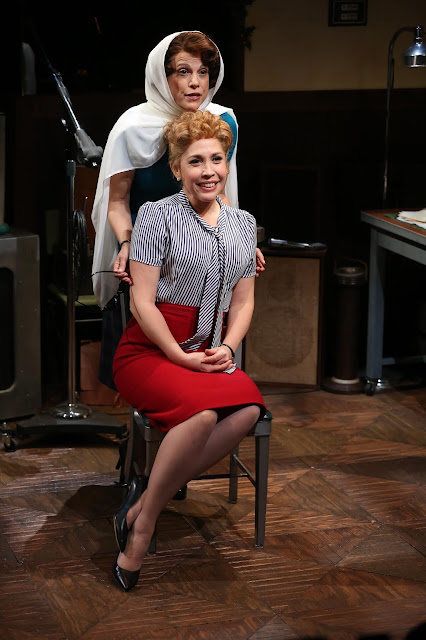“Not Born Yesterday”


The smart blonde who gives her name to this modest but only fitfully effective little biomusical at 59E59 Theaters is Judy Holliday, a singer-actress-comedienne born Judith Tuvim (meaning “holiday”). She was Jewish, hailed from Sunnyside, Queens, and died in 1965 of breast cancer, at 44. When I was growing up in the 40s and 50s, Holliday was a household name even though her fame was largely centered on two roles.
 |
| Andréa Burns. Photo: Carol Rosegg. |
The first was Billie Dawn, the presumably dumb blonde with a
broad New York accent who turns out to be a genius in the rough in Garson Kanin’s
1946 Broadway play Born Yesterday;
it’s a part that won her an Academy Award for the 1950 movie version. Then came
the Tony for her next most famous part, phone operator Ella Peterson in Betty Comden and Adolph Green’s 1956 Broadway
musical, The Bells Are
Ringing, a role she repeated in the 1960 film.
In Smart Blonde, Willy
Holtzman has concocted a chamber musical taking place in 1964, in a music studio (realistically designed
by Tony Ferierri), where Judy (Andréa Burns, On Your Feet), preparing to make a record, is having trouble because
something’s weighing on her mind. As her memories begin to crowd in, the
session becomes Holtzman’s framing device for taking us on a through-the-years (without year markers, though) overview of Judy’s life, the transitions marked by Alan Edwards’s
many lighting cues.
Her accompanist, Bernie (Jonathan Spivey), her copyist,
Ruthie (Andrea Bianchi), and her recording engineer, Elliott (Mark Lotito) morph
from one person in her life to another, although their 1964 clothes (by Michael
McDonald) change only in minor ways from role to role.
Among the people we meet are Judy’s parents, Abe (Spivey)
and Helen (Bianchi); her Uncle Joe (Lotito), whose communist leanings
influence her political beliefs; movie producer Darryl Zanuck (Spivey), whose roaming
hands introduce her to Hollywood casting practices; songwriters Comden
(Lotito) and Green (Bianchi); a leftwing cop named Yetta Cohn (Bianchi), with whom
she has a more than platonic friendship; and another movie producer, the brash
Harry Cohn (Spivey), who criticizes her for being fat.
Other famous names involved include Garson Kanin (Spivey) and
his wife, actress Ruth Gordon (Bianchi); clarinetist David Oppenheim (Lotito),
whom she married, had a boy with, and divorced; actor Jack Lemmon (Spivey); director
George Cukor (Lotito); and even Marilyn Monroe (Bianchi), who visits her backstage
after Judy does a routine inspired by Monroe’s “I Wanna Be Loved By arYou.”
We get brief accounts of Judy’s career milestones, her
considerable intelligence (an IQ of 172), her being named a Communist sympathizer
by Red Channels and her consequent
blacklisting, her romantic and marital issues, and her illness. The narrative
is leavened every now and then by one of 10 musical interpolations.
She warbles several less-familiar numbers, such as “What’s the Rush” and “It Must Be Christmas,” whose lyrics she wrote to the music of her post-divorce boyfriend, jazz musician Gerry Mulligan (Lotito). But the emphasis is on classics like “I Can’t Give You Anything But Love,” “Let’s Fall in Love,” and “What’ll I Do.”
She warbles several less-familiar numbers, such as “What’s the Rush” and “It Must Be Christmas,” whose lyrics she wrote to the music of her post-divorce boyfriend, jazz musician Gerry Mulligan (Lotito). But the emphasis is on classics like “I Can’t Give You Anything But Love,” “Let’s Fall in Love,” and “What’ll I Do.”
Plays and movies about the blacklisting, which prevented so many
talented people from getting work in movies or broadcast entertainment, are fairly common. Seeing yet another celebrity being cross-examined by politicians—perhaps
the play’s central scene—is anything but novel. What stands out here, however, is
Judy’s decision to play the situation as Billie Dawn, which throws the men off the
scent. (The script says Cohn paid $10,000 to get her off the blacklist.)
Since director Peter Flynn’s episodic production rushes by
in 90 minutes, it can’t avoid superficiality, or the sense that we’re missing
important things. One thing I definitely missed--its absence probably connected to rights
issues--is the lack of a single song from Bells Are Ringing. It would have been nice to hear Burns render
a tune like “The Party’s Over,” which you can see Holliday herself do here on YouTube. On the other hand,
Burns performs what she’s given with Holliday-like charm. She has a sweet
personality and big smile, and, while she looks nothing like the original, really
nails her speaking voice, with its pronounced Big Apple vowels and the high-pitched, comical
harshness Holliday often employed when her characters were upset.
Burns’s supporting company lacks the versatility to cover their
many roles with anything other than workmanlike portrayals. They exaggerate
their portrayals of the Jewish show biz types, none of them ringing true.
Bianchi, otherwise the best of the trio, doesn’t come close to what should be her
standout moment, as Marilyn Monroe, losing all that marvelous creature’s
delectable naturalness in favor what comes off as a sashaying, self-consciously
grand star in the Gloria Swanson tradition.
Unless you’re a Judy Holliday fan, I’d take a take a pass on
this only passably entertaining show.
59E59 Theaters/Theater B
59 E. 59th St., NYC
Through April 13
OTHER VIEWPOINTS:





